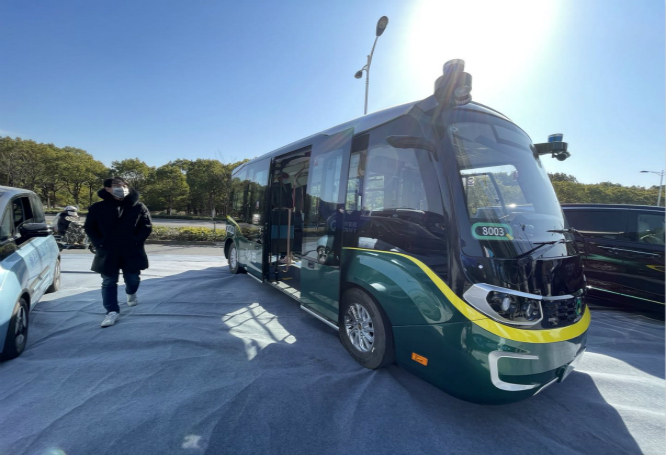Self-driving test hub up to speed

China’s first comprehensive self-driving testing hub was launched in Shanghai’s southern outskirts on Saturday for global automakers to explore and test autonomous driving.
The Full-chain Smart Driving Innovation Pilot Zone was opened at the Future Space innovation park in Fengxian District with six self-driving testing scenarios for community, campus, industrial park, sightseeing spot, shopping complex and urban district.
Jointly developed by the Fengxian government, Lingang Group and Shanghai Jiao Tong University, the pilot zone includes 7.8 kilometers of open roads, 960 meters of inner roads within parks, along with 1.11 kilometers of underground roads in parking garages.
It is the nation’s first open self-driving testing area covering every aspect of traffic, and is expected to meet the demands of people’s “last kilometer” travel, according to the district government.
More than 30 projects, with a total investment of 20 billion yuan (US$3.1 billion), signed agreements to launch their autonomous driving projects in the newly unveiled zone on Saturday. It is estimated they will create a total industrial value of up to 50 billion yuan.
In a highlight project, Baidu is to develop its self-driving project Apollo in Fengxian. Testing of the unmanned bus will soon be launched.
Apollo will explore self-driving applications in public transport in Fengxian’s Nanqiao Town. It will help the district create “a highland in talent, technology and industrial ecology for the intelligent network,” said Zhang Dongchen, Baidu Group vice president.
Other leading automakers such as SAIC-GM, Ford, Weltmeister and AIWAYS have also agreed to invest in the zone.
“The development of V2X, or vehicle-to-everything, has just begun in China, so there are few open roads for us to test autonomous driving,” Wang Chendong, an SAIC-GM official, said. “The new zone offers us a chance to test our mass-produced self-driving vehicles.”
Enea Colombo, general manager of Icona Design Shanghai, said Shanghai has a great opportunity to develop autonomous driving, though the technology still needs to be developed. “With the fast pace in Shanghai, I think (the autonomous driving) will be there quite soon,” Colombo said.
Shanghai has set up a handful of intelligent network vehicle hubs in Fengxian and Jiading districts as well as Lingang and Jinqiao in Pudong with leading standards, said Wu Jincheng, director of the Shanghai Commission of Economy and Information.
Compared with the others, the new testing zone in Fengxian focuses on the smart connections between vehicles and roads, said Yin Chengliang, president of Shanghai Intelligent and Connected Vehicle R&D Center Co, operator of the zone in Fengxian.
It is the first time that underground roads and self-parking have been developed for a testing zone in Shanghai.
“Various sensors are installed on the roads and surrounding areas to guide the self-driving vehicles through 5G communication technology,” Yin said.
The technology has largely cut autonomous driving cost. The costly radars installed on self-driving vehicles can be replaced by cheaper sensors, which offer broader commercial applications, Yin said.
China is aiming for vehicles with at least partial self-driving technology to comprise 50 percent of new car sales by 2025, doubling its previous goal. Chinese and multinational carmakers are trying to offer rides to ordinary people to test the new technology and ease anxieties about safety.
To meet the ambition, construction has started on the second phase of the testing zone in Fengxian with a total of 87.5 kilometers of open roads for self-driving testing, according to Xu Jianlong, Party secretary of the suburban district’s economic commission.
